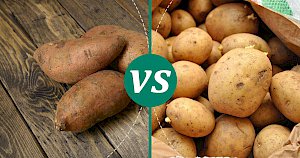Potato vs Yam: Nutrition, Calories & Protein Compared


Potato vs Yam
Nutrition Facts
Serving size:
change
5g10g15g20g30g40g50g60g80g100g120g140g160g180g200g220g250g300g350g400g450g500g600g700g800g900g1000g
1oz2oz3oz4oz5oz6oz7oz8oz10oz12oz15oz20oz25oz30oz35oz40oz50oz
Amount Per Serving:
Serving size:
change
5g10g15g20g30g40g50g60g80g100g120g140g160g180g200g220g250g300g350g400g450g500g600g700g800g900g1000g
1oz2oz3oz4oz5oz6oz7oz8oz10oz12oz15oz20oz25oz30oz35oz40oz50oz
Amount Per Serving:
Potato vs Yam 100g Compare
| per 100g | Potato | Yam |
|---|---|---|
| Calories | 77 | 118 |
| Carbohydrates | 17.49 g | 27.88 g |
| Fat | 0.09 g | 0.17 g |
| Saturated fat | 0.01 g | 0.04 g |
| Dietary fiber | 2.1 g | 4.1 g |
| Protein | 2.05 g | 1.53 g |
| Water | 79.25 g | 69.6 g |
| Calcium | 12 mg | 17 mg |
| Iron | 0.81 mg | 0.54 mg |
| Magnessium | 23 mg | 21 mg |
| Potassium | 425 mg | 816 mg |
| Sodium | 6 mg | 9 mg |
| Vitaminium A | 2 µg | 138 µg |
| Vitaminium B1 (Thiamine) | 0.081 mg | 0.112 mg |
| Vitaminium B2 (riboflavin) | 0.032 mg | 0.032 mg |
| Vitaminium B3 (Niacin) | 1.061 mg | 0.552 mg |
| Vitaminium B5 | 0.279 mg | 0.314 mg |
| Vitaminium B6 | 0.298 mg | 0.293 mg |
| Vitaminium B9 (Folic acid) | 0.015 mg | 0.023 mg |
| Vitaminium C | 19.7 mg | 17.1 mg |
| Vitaminium E | 0.01 mg | 0.35 mg |
| Vitaminium K | 0.002 µg | 0.002 µg |
| Beta karoten | 4 mg | 83 mg |
When it comes to root vegetables, potatoes and yams are often mentioned in the same breath. However, despite their common categorization and similar role in many diets around the world, these two tubers are quite different in terms of nutritional content, culinary uses, and even botanical classification. Let's dig into the interesting world of these staple foods, compare their nutritional profiles, and discover which one might be the better choice for your dietary needs.
A Brief Introduction to Potatoes and Yams
Potatoes are one of the most consumed vegetables worldwide, known for their versatility in various cuisines. Originating from the South American Andes, potatoes have become a staple food in many countries due to their adaptability to different climates and soil types.
Yams, on the other hand, are less known globally but are a vital source of nutrition in many parts of Africa, Asia, and the Caribbean. Unlike potatoes, yams can grow to a much larger size and have a thicker, rougher skin. There are many varieties of yams, with colors ranging from white to vibrant orange.
Comparing the Nutritional Content
When deciding between potatoes and yams, understanding their nutritional differences is crucial. Here's a quick overview based on an average serving size:
- Calories: Potatoes contain fewer calories (77) compared to yams (108), making them a slightly better option for calorie-conscious individuals.
- Carbohydrates: Yams are higher in carbs (27.88g) than potatoes (17.49g), which could be beneficial for those needing extra energy for endurance activities.
- Fiber: With 4.1g of fiber, yams provide almost double the amount found in potatoes (2.1g), offering better support for digestive health.
- Protein: Potatoes have a slight edge in protein content (2.05g) over yams (1.53g).
- Vitamins and Minerals: Yams are rich in vitamin A and potassium, whereas potatoes provide a good source of vitamin C and have a slightly higher iron content.
Both potatoes and yams contain no cholesterol and are low in fat, making them heart-healthy choices. However, yams' higher fiber and vitamin A content, along with their significant potassium levels, make them slightly superior in terms of nutritional benefits. Yet, potatoes are not to be overlooked, especially considering their vitamin C and iron content, which are essential for immune health and energy levels, respectively.
What to Choose for Your Diet?
The decision between potatoes and yams should depend on your specific dietary needs and health goals. If you're looking for a lower-calorie option with a good dose of vitamin C, go for potatoes. On the other hand, if you need more fiber, potassium, and vitamin A in your diet, yams are the way to go.
Regardless of your choice, both of these tubers are nutritious and can be a healthy part of your diet when prepared in a health-conscious manner. Whether baked, roasted, or boiled, incorporating these root vegetables into your meals can add a nutritious boost to your diet.
In conclusion, while potatoes and yams may seem similar at first glance, they offer distinct nutritional profiles that cater to different dietary needs. By understanding these differences, you can make an informed decision on which tuber best fits your nutritional requirements and culinary preferences.
Potato 100g
77kcalCalories source
- 89% CARBS.
- 10% PROTEIN
- 1% FAT
Yam 100g
118kcalCalories source
- 94% CARBS
- 5% PROTEIN
- 1% FAT
Compares of potato
- Potato vs Artichoke
- Potato vs Asparagus
- Potato vs Bamboo Shoots
- Potato vs Beetroot
- Potato vs Pepper
- Potato vs Bitter Melon
- see all compares of potato
Compares of yam
Read also:
- Calories from Potato
- Calories of Pumpkin
- Calories in Purslane
- Salad chicory calories per 100g
- Radish protein per 100g
- How many calories does rhubarb have?
- Calories in a half of shallot
- Calories in whole shallot
- Calories for one, two or more shallots
- Calories in handful of shallots
- Calories in tablespoon of shallot
- How much protein in spinach?
Marcin Piotrowicz
calories-info.com creator
Healthy diet and healthy lifestyle promoter
Add comment